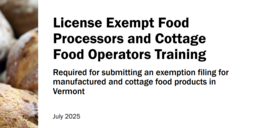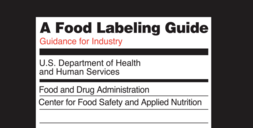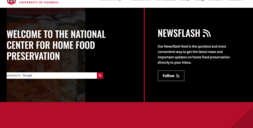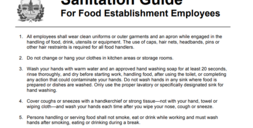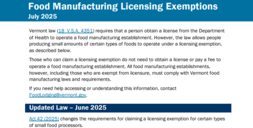On July 1, the Health Department adopted the Manufactured Food Emergency Rule to align with Act 42 (2025). Act 42 changes the requirements for claiming a licensing exemption for certain types of small food processors. Read about the changes for license exempt food processors and cottage food operators.
What You Need to Know about Home-Based Food Licenses or License Exemptions
You will need a home-based food license if you operate a bakery, make prepared food for sale direct-to-customer, or prepare food for cooking later at an event in your home kitchen.
How to Get a Home-Based Food License or License Exemption
| License type | is needed to: |
|---|---|
| Home Bakery License |
Home bakeries with less than $30,000 gross annual sales may qualify for a cottage food operator license exemption. Go to the next question: "Can I get an exemption?" for more information. |
| Home Caterer License |
|
After you decide which license you need, submit the application and supporting documents online at least 30 days before you plan to start operating. You will be assigned a public health inspector for your opening inspection. The Health Department will email you the license once you pass the inspection.
Home Bakery and Home Caterer licensees must follow the Health Regulations for Food Service Establishments.
Vermont law (18 V.S.A. 4351) requires that a person obtain a license from the Department of Health to operate a food manufacturing establishment. However, the law allows people producing small amounts of certain types of foods to operate under a licensing exemption, as described below. Those who can claim a licensing exemption do not need to obtain a license or pay a fee to operate a food manufacturing establishment. All food manufacturing establishments, however, including those who are exempt from licensure, must comply with Vermont food manufacturing laws and requirements. Read about the changes for license exempt food processors and cottage food operators.
If you claim a licensing exemption, you must:
- Complete annual training. Take the License Exempt Food Processors and Cottage Food Operators Online Training with information about the Manufactured Food Emergency Rule and food safety.
- Label products for sale as required under the Manufactured Food Emergency Rule.
- File a Health Department exemption in the online portal each year before January 15.
| Exemption Type | EXEMPTION REQUIREMENTS |
|---|---|
Food Processor with annual sales of $10,000.00 or less | Act 42 (2025) provides a licensing exemption for food manufacturing establishments that process and package food for resale and have gross annual sales of less than $10,000.00.
|
| Cottage Food Operator with annual sales $30,000.00 or less of cottage food products | Act 42 (2025) provides a licensing exemption for cottage food operators that:
Cottage food products are defined in rule as food sold by a cottage food operator that does not require refrigeration or time or temperature control for safety. Cottage foods include, but are not limited to, the following:
|
It is the manufacturer’s responsibility to ensure the food product they are producing meets the definition of "cottage food product.” Food manufacturers may request review of their product by the Department using the Cottage Food Product Review Request Form to have certainty that a product qualifies as a cottage food product. However, manufacturers do not need to seek approval from the Health Department to determine whether the product they are producing is a “cottage food product.”
Food made under a license exemption cannot be sold to restaurants or other licensed food establishments.
You are not exempt from following food safety and sanitation requirements in the Manufactured Food Rule. A public health inspector may inspect your establishment to make sure you are meeting requirements.
Other Steps You Need to Take
- You must be able to wash, rinse and sanitize equipment and utensils in separate compartments.
- If your kitchen has a two-compartment sink, a plastic tub can be used as the third compartment for sanitizing.
- A manual sanitizing step is still required if you use a dishwasher.
- You must use a test kit or sanitizer test strips to check the concentration of sanitizer solution.
- Be sure the sanitizer you use is approved for food service.
- Use gloves, tongs or other utensils to avoid bare hand contact with ready-to-eat food.
- Keep a thermometer in the refrigerator to make sure the temperature stays at 41°F or below.
- Use a probe thermometer to take internal food temperatures if applicable.
- Separate the food you sell from food you prepare for yourself or other people or pets in your home.
- Prepare food you sell when there are no other activities happening in the kitchen.
- Keep small children and pets out of the kitchen while preparing food you sell.
- If you use a private well for water, test water annually for total coliform bacteria and E. coli at a certified lab. You must submit a copy of acceptable test results before an inspection can be done.
- If you rent, contact your landlord or property manager for permission to operate a home-based business.
- Contact your city or town to determine if your space follows local land use, development, and zoning for residential properties.
- Depending on how your business is structured, you may need to register with the Secretary of State’s office.
- Contact the Department of Taxes to set up a tax account if necessary.
What needs to be labeled?
Food that is sold in packaged form needs to be labeled. Food items sold from bulk containers do not need to be individually labeled, but can instead display a clearly visible sign, placard or table tent at the service location that bears the label information.
What needs to be on my product labels?
- The name and address of the producer
- The name of the food product
- The ingredients of the food product from those used in the greatest amount to the smallest amounts
- The net weights or volumes of the food product
- Allergen information as specified by federal labeling requirements
- You must use nutritional labels if any claims are made about nutrient content, health benefits, or if other nutritional information is provided.
- If operating under a license exemption, write the following statement: “Made in a home kitchen not inspected by the Vermont Department of Health” in at least 10-point font in a contrasting color to the background label.
Example of a Label
Here is an example of a label for chocolate chip cookies with allergens:
Tips for Food Allergen Labeling
There are nine major food allergens: milk, eggs, fish, crustacean shellfish, tree nuts, peanuts, wheat, soybeans and sesame.
You can list food allergens on a label by:
- Using parentheses after the name of the ingredients. Example: Flour (Wheat), Soy Lecithin (Soy), Nonfat Dry Milk (Milk).
- Using a “Contains” statement after the ingredients list. Example: Flour, Soy Lecithin, Nonfat Dry Milk. Contains Wheat, Soy, and Milk.”
Nutritional Labeling
Almost all home-based establishments and exempt food manufacturers are exempt from nutritional labeling requirements based on gross annual sales and the volume of food manufactured. However, a Nutrition Facts Panel is required if you make a nutrient content or health claim on the label. Examples of these include “sugar-free,” “low fat” or “reduces risk of heart disease.”
Do I need to file a new form if I’ve submitted one in the past? Do I need to complete the training?
If you have already filed an exemption form with the Health Department, you will need to follow these steps to update your information with the Health Department:
- Review the information in this guidance document to decide if you still meet the requirements for a license exemption under the new law.
- Review the Health Department’s online training with information about the new law and food safety.
File a new license exemption form by January 15, 2026, and by January 15 each year after that.
What is a cottage food?
Cottage foods products are lower-risk foods that do not require refrigeration or time/ temperature control for safety (for example, shelf-stable foods that do not need to be kept hot or cold to prevent the growth of hazardous bacteria or microorganisms).
For example, baked goods like breads and cookies would be considered cottage food. However, foods that need to be cooked for a certain length of time or kept at a certain temperature to prevent risks of illness from consumption, such as baked goods that need to be kept cold, like quiche, cheese danish, and cheesecake, are not cottage foods and do not qualify for the exemption.
I filed the license exemption self-attestation online. What happens next?
You will receive an email notice that the exemption attestation was received. There is no other documentation or certificate that is sent to you. Once you’ve completed the online training and filed the exemption attestation, you are ready to operate under the license exemption.
How do I know if I’m making a cottage food if it isn’t on the list?
Check to see if your food product falls within the Health Department’s definition of “cottage food product” above, and the definition of time/temperature control for safety (TCS) food in the Manufactured Food Emergency Rule.
If you determine that your product meets the definition of cottage food product, you don’t need to request a review from the Health Department.
If you’re not sure if your product qualifies, you can request that the Health Department review your product by completing the Cottage Food Product Review Request Form to have certainty that your product is a qualifying cottage food product.
What is a time/temperature control for safety (“TCS”) food?
Under the Manufactured Food Emergency Rule, TCS food ” has the same meaning as the term as defined in the FDA 2022 Food Code and means a food that requires time and/or temperature control to limit pathogen growth or toxin formation and keep the food safe for consumption.
Some examples of TCS foods include:
• Meat (beef, pork, lamb)
• Poultry (chicken, turkey, duck)
• Fish • Shellfish and crustaceans
• Eggs
• Milk and dairy products
• Cooked, plant-based foods (e.g., cooked rice, beans, or vegetables)
• Baked potatoes
• Mushrooms
• Raw sprouts
• Tofu and soy-protein foods
• Untreated garlic and oil mixtures
Do I need to complete a training? Do I need to file anything with the Health Department?
Yes, anyone claiming a licensing exemption must take the Health Department’s online training with information about the Manufactured Food Emergency Rule and food safety. Once the training is completed, the person seeking the licensing exemption must file a Health Department license exemption form before January 15, 2026, and by January 15 each year after that.
Can I be exempt from licensure and produce both cottage foods and non-cottage foods?
Yes, you can make up to $30,000 worth of cottage foods under the cottage food operator exemption, plus up to $10,000 of processed foods under the exemption for food processors with annual sales of $10,000 or less. Food manufacturers must still comply with all state laws for food manufacturing establishments even if they are exempt from licensure and licensing fees.
I prepare meals in my home kitchen that I sell directly to customers. Do I qualify for one of the exemptions?
No. If you make prepared food/meals for sale direct-to-customer or prepare food for cooking later at a special event or at a farmers market, you need a Home Caterer License. You may also need a Temporary Food Service License for the event.
Do I have to include my physical home address on my product labeling, or can I use a post office box?
You should use the physical address of your home kitchen on your product label, not a post office box. The purpose of including an address on product labels is to be able to locate the business in case of a recall or traceback associated with a foodborne illness complaint or outbreak. The labeling requirements in Manufactured Food Emergency Rule Section 6.2.1 specify that the name and address of the business must be included on the label.
Can I make and sell dehydrated meats or dehydrated fruits and vegetables under the cottage food operator exemption?
No. Meats are a potentially hazardous food and are not cottage food products that fall under the exemption. Dehydration of fruits and vegetables is a specialized process that requires special equipment to ensure the food is consistently processed to a water activity value that would make the food non-potentially hazardous.
Can I make products in a rented kitchen and sell them under the cottage food operator exemption?
No. The cottage food operator exemption applies only to the production of cottage foods in the kitchen of a food manufacturer’s private, residential dwelling or in a kitchen on the food manufacturer’s personal property. If a food manufacturer rents kitchen space, even if it is a licensed commercial kitchen facility, they would need to be licensed to sell the products made there.
If I claim a licensing exemption, can I sell the food products I make in my home kitchen to a local restaurant?
No. Food service establishments, like restaurants, may only purchase food products from licensed food manufacturers per the Health Regulations for Food Service Establishments.
I’m a licensed food processor. Does the Manufactured Food Emergency Rule change the requirements that apply to me?
The Manufactured Food Emergency Rule only exempts from licensure and licensing fees cottage food manufacturers with gross annual receipts of $30,000 or less and food manufacturers with gross annual receipts of $10,000 or less. Even those that qualify for a licensure and licensing fee exemption must still comply with all other applicable laws. The Manufactured Food Emergency Rule does not change or impact licensing or any other requirements for food manufacturers that do not qualify for an exemption.
Resources
Contact Us
Food & Lodging Program
Mailing address:
VT Dept of Health
Environmental Health
Food & Lodging Program
280 State Drive
Waterbury, VT 05671-8350
Phone: 802-863-7221 or 800-439-8550 (toll-free within Vermont)
Fax: 802-863-7483
Email: FoodLodging@vermont.gov

